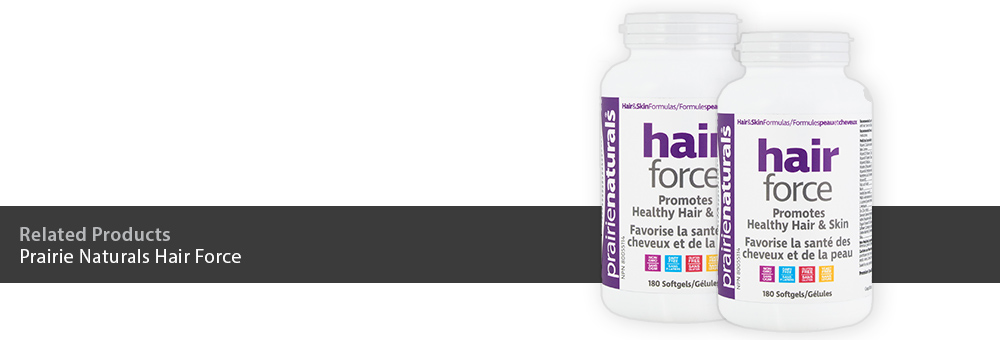

Healthy Hair from the Inside Out
Your hair tells a story about your overall well-being. Healthy, shiny hair is one indication of vibrant physical health, while thinning, brittle, dull and lifeless hair tells an entirely different story.
While you may think that your nutrient intake is adequate, the fact is that even suboptimal levels of specific nutrients make a noticeable difference to the health and appearance of your hair and scalp. Recent studies have revealed that many North Americans are chronically deficient in several of the major nutrients that promote healthy hair.
In addition, stress, illness and hormone-related metabolic factors impact significantly on hair health. Aging, environmental sensitivities, medications (especially birth control pills) and recreational drug and alcohol use also influence the healthy look and feel of hair.
It may be difficult to determine the exact cause of deteriorating hair health, but one thing is certain: you can improve the health of your hair by improving nutritional intake.
Nutrients for Healthy, Strong Hair
Vitamin A
Retinoids from vitamin A “increase the rate of hair growth and produce denser hair regrowth.” Vitamin A also helps regulate healthy levels of sebum, the hair-protective oil secreted by glands on our scalps.
Vitamin B Complex
Vitamin B1 helps metabolize protein which gives hair natural lustre, volume and good texture.
Vitamin B2 requirements are greatest under stress and stringent dieting. Thinning hair in women can be directly related to low levels of B2.
Vitamin B3 enhances circulation to the scalp and all parts of the body.
Vitamin B6 is considered the best nutritional friend of any stressed out, hormonally challenged woman. Researchers in Poland found that this powerful stress buster reduced hair loss in women and generally improved the condition of their hair.
Pantothenic acid (B5) has long been considered an anti-graying agent for hair. Another potent stress fighter, pantothenic acid reduces adrenal stress and exhaustion, known contributors to hair loss.
Vitamin B12 insufficiency is a common cause of prematurely grey hair. Fortunately restoring adequate B12 levels can reverse the graying trend and help return hair to its original colour. As we age, our B12 requirements increase.
Folic acid is necessary for DNA replication and repair and is a factor in healthy hair growth. Folic acid supplementation reduces homocysteine levels which are known to accelerate the aging process.
Biotin is required for healthy metabolism and growth, proper fatty acid synthesis and enzyme production. Research has also pointed to biotin playing a key role in maintaining healthy hair, preventing hair loss and delaying graying. Commonly used both internally and topically, biotin is a popular nutritional remedy for hair and skin health.
Other Vitamins and Minerals that promote growth
Vitamin C protects us against the environmental pollutants that can wreak havoc on our hair.
Vitamin D3 “dramatically” stimulates hair growth! At the UCLA School of Medicine researchers were able to stimulate significant hair growth in mice with alopecia (baldness) conditions similar to humans.
Selenium is a powerful antioxidant and anti-aging mineral. It protects against environmental toxicity and is instrumental in thyroid hormone metabolism, both of which impact on hair health and vitality.
Zinc There is a direct correlation to alopecia (hair loss) and zinc deficiency.
Choline & Inositol Working in concert, they act as potent anti-stress nutrients and are thought to keep hair follicles healthy at the cellular level.
Iodine Low levels of this essential trace element lead to sluggish thyroid gland function and a slowdown of metabolic rate. Hair loss and dry, brittle hair are common indicators of low thyroid function.
PABA may prevent hair loss by protecting hair follicles.
L-cysteine is a detoxifying amino acid that provides potent antioxidant protection to the hair follicle. Inadequate levels of dietary l-cysteine impede the production of keratin needed for regenerating healthy hair while supplemental cysteine may speed hair growth and increase hair shaft diameter resulting in fuller hair.
L-methionine deficiency may be the cause of hair that is “brittle, short and sparse.”
Clinical data indicates sulfur containing amino acids prevent hair cell loss related to toxicity.
Organic flax and safflower seed oils have an internal moisturizing effect that adds shine and lustre to hair.
Risk factors for hair health
Stress, illness, insulin resistance and diabetes are just some of the reasons we suffer hair loss. Menopause, Andropause, Pregnancy any type of hormonal fluctuation will result in drastic changes to not just our bodies but also our hair. Supplements are perfect for those who are busy and unable to ingest the proper vitamins and minerals through diet. If you notice your hair isn’t as strong and shiny as it used to be – why not try HairForce to give your locks a boost?

